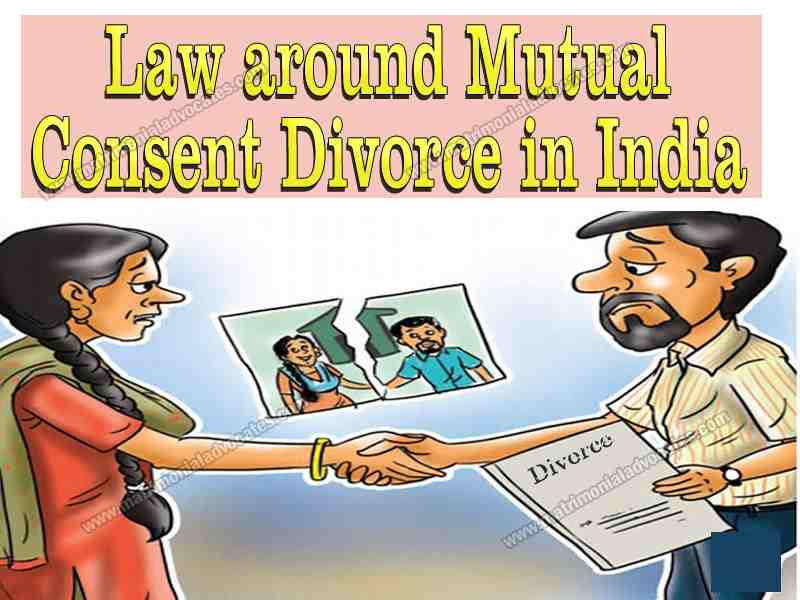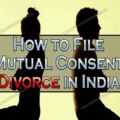
The provisions of mutual consent divorce has various elements attached to it and is not a simpliciter term. For Instance, under the Hindu Marriage Act, 1955, the ingredients for seeking a decree of mutual consent divorce are as follows:-
- That the petition for mutual divorce should be presented and initiated before the District Court by both the parties, mutually.
- Both the parties to the marriage should have been living separately for a period of one year or more.
- The parties should satisfy the Court that they have not been able to live together and that they have mutually agreed that the marriage should be dissolved.
These grounds are essential in the case of presentation of the first motion petition of divorce. Once the first motion is passed, the subsequent process involves a period of interregnumwherein it prescribes a cooling period not earlier than six months and not later than eighteen months for the presentation of the second motion petition, thereafter which a decree for mutual divorce may be granted.
In various landmark judgments, these essential ingredients of mutual consent divorce has been discussed under various lights. The most significant and recent development in the sphere of mutual consent divorce is the waiver of the cooling off period, i.e. the six month period prescribed for presentation of the second motion of divorce.
The Supreme Court in the case of Amardeep Singh v. Harveen Kaur, MANU/SC/1134/2017, the Supreme Court laid emphasis on the fact that “forcbile perpetuation of status of matrimony between unwilling partners did not serve any purpose.” Further the Court held that “the object was not to perpetuate a purposeless marriage or to prolong the agony of the parties when there was no chance of reconciliation.”
The Apex Court in the above judgment laid down few aspects that needed consideration while waiving of the statutory period as prescribed under Section 13B (2) which are as follows:
1. The statutory period of six months specified in Section 13B(2), in addition to the statutory period of one year under Section 13B(1) of separation of parties is already over before the first motion itself;
2. All efforts for mediation/conciliation including efforts in terms of Order XXXIIA Rule 3 CPC/Section 23(2) of the Act/Section 9 of the Family Courts Act to reunite the parties have failed and there is no likelihood of success in that direction by any further efforts;
3. The parties have genuinely settled their differences including alimony, custody of child or any other pending issues between the parties;
4. The waiting period will only prolong their agony.
Another important ingredient and the judgment governing that is that of the Supreme Court in the case of Sureshta Devi v. Om Prakash, AIR 1992 SC 1904. In this case, an interpretation was given to the ingredient of “living separately” which is a fundamental ground that needs to be present before the presentation of the first motion of divorce by mutual consent. The two main elements discussed in this judgment were that “the period of living separately for one year must be immediately preceding the presentation of petition.” The second element discussed was regarding the meaning and the connotation of the term “living separately”. Justice K.J. Shetty, in the said judgment observed that:
“The expression ‘living separately’ connotes not living like husband and wife. It has no reference to the place of living. The parties may live under the same roof by force of circumstances, and yet they may not be living as husband and wife. The parties may be living in different houses and yet they could live as husband and wife. What seems to be necessary is that they have no desire to perform marital obligations and with that mental attitude they have been living separately for a period of one year immediately preceding the presentation of the petition.”
The judgment of Sureshta Devi also dealt with the aspect of withdrawal of consent in a mutual consent divorce. There are two scenarios that can occur in this situation. The first being that one of the party may withdraw their consent for bona-fide reasons and thereby proceed with contested divorce in the Court of Law. The other situation that arises is that of wilful withdrawal of consent in mutual divorce with a mala-fide intent which attracts contempt proceedings. In the case of Shikha Bhatia vs. Gaurav Bhatia & Ors., Avneesh Sood vs. Tithi Sood and Rajiv Chhikara vs. Sandhya Mathu, the concept of withdrawal of consent has been discussed in detail and in the first two cases it has been held that a spouse, who gives an undertaking to the court to abide by the consent given in the First motion for dissolution of marriage cannot resile from such an undertaking and doing so would amount to a breach of the undertaking hence attracting contempt proceedings. In the third judgment of Rajiv Chikkara, the withdrawal of consent amounted to mental cruelty.
Recently, the Delhi High Court entertained a batch of petitions filed by aggrieved spouses who had withdrawn their consent or failed to appear at the time of filing of second motion. The Delhi High Court in this case laid down certain guidelines that need to be followed while recording the undertaking/agreement of the parties with respect to a petition under Section 13B(1) or a motion under Section 13B(2) of the Act, 1955.
Despite, such provisions in place, the mutuality aspect of the provision for mutual divorce should not be overlooked and the court should make the best possible efforts in trying to reconcile a marriage wherever possible and wherever such withdrawal of consent has been done with bona-fide intentions.
Going through Matrimonial Issues! Need legal advice on 498A,
Divorce, Child Custody, Domestic Violence. We are providing a niche platform
for knowledge sharing, researching and finding an Advocate for a person who is
facing litigation and gives solution for all your legal queries. MatrimonialAdvocates.Com has expert divorce
lawyers across the country.
Disclaimer: These articles are providing only general information regarding Indian Laws and should not be construed as legal advice on any subject matter. Please speak to an Advocate to discuss your specific case.





